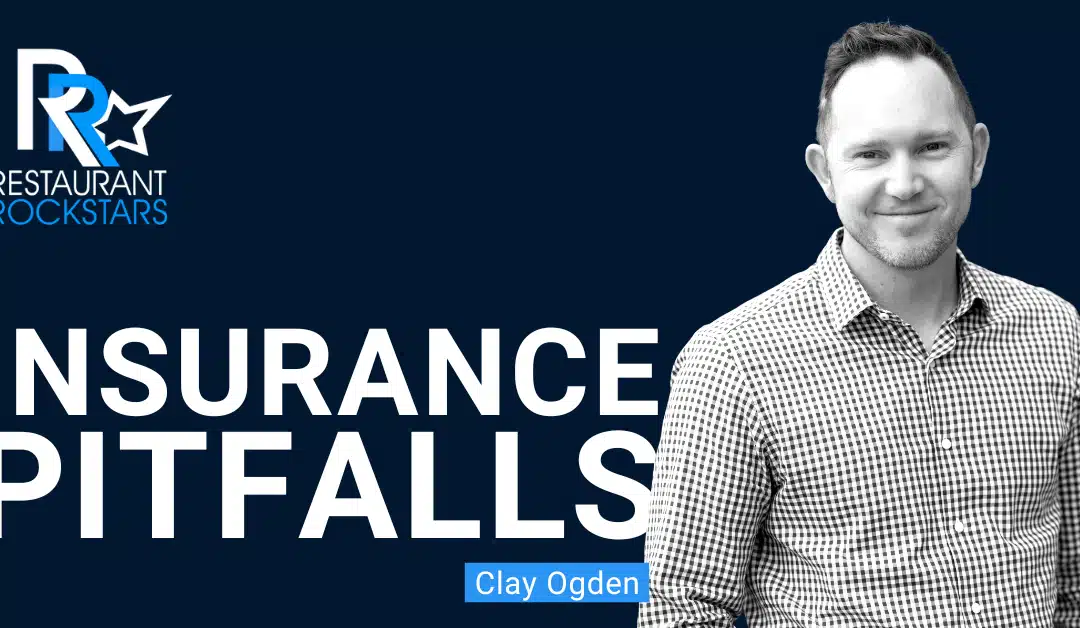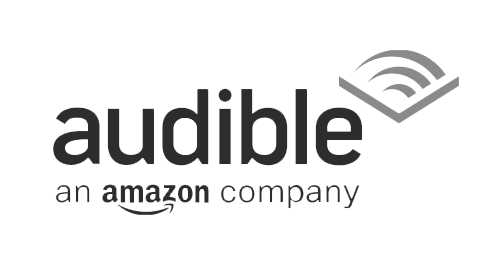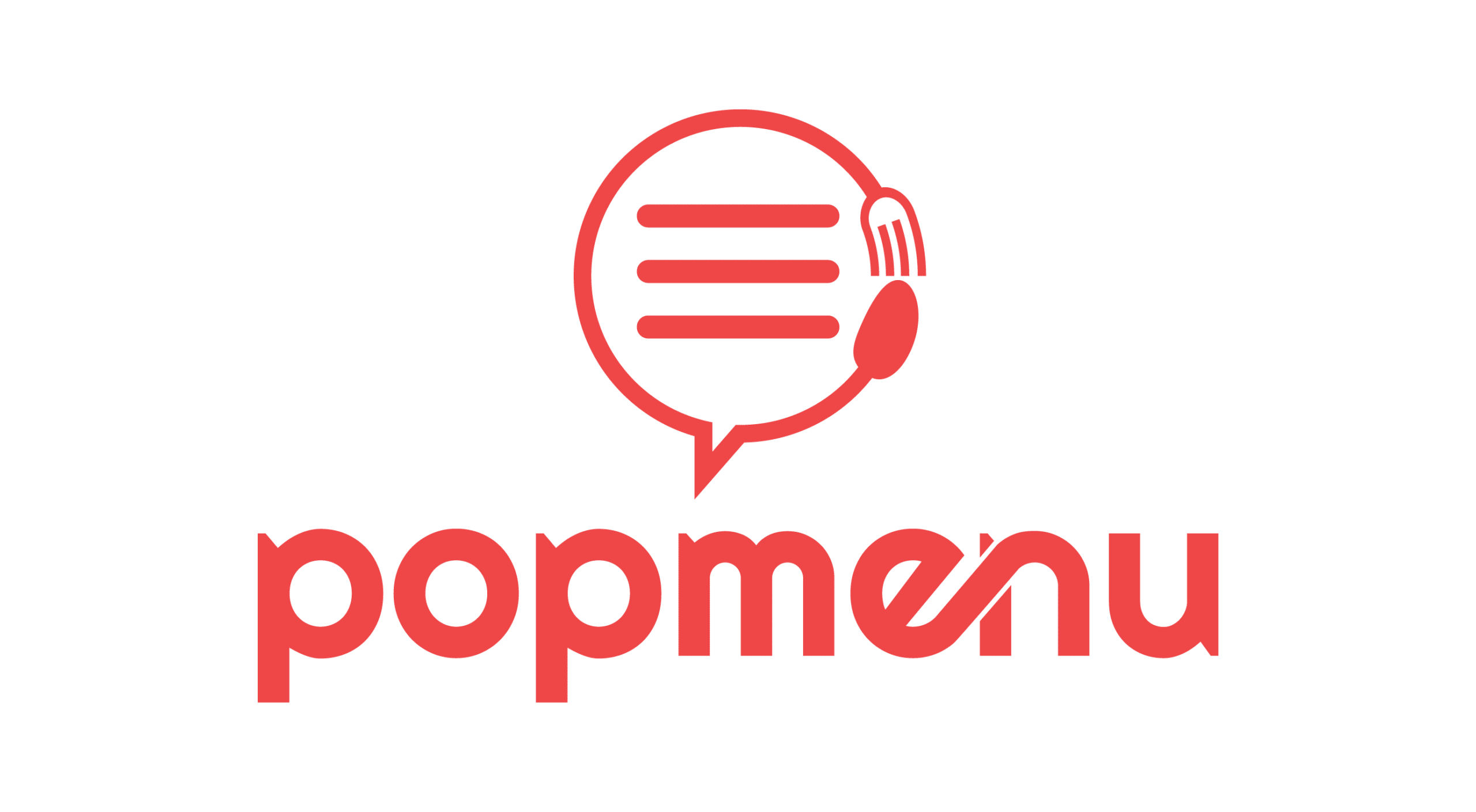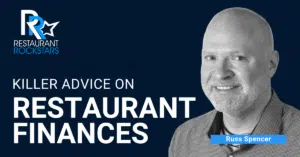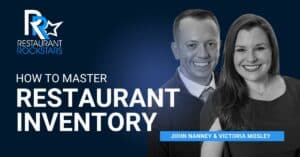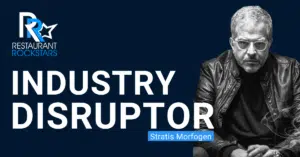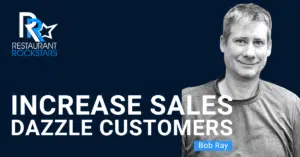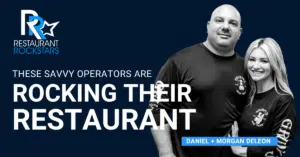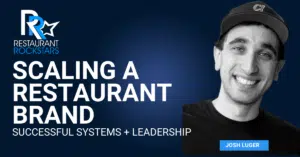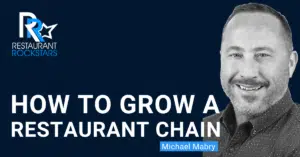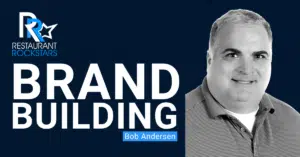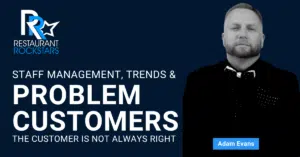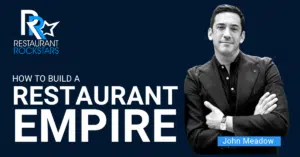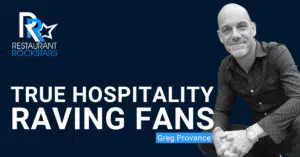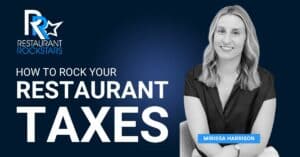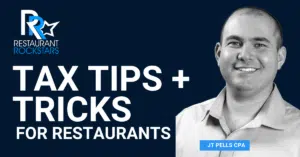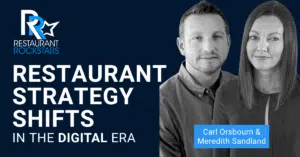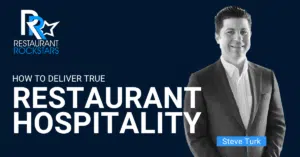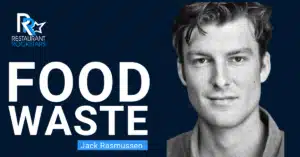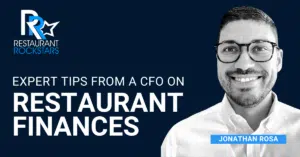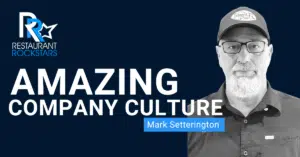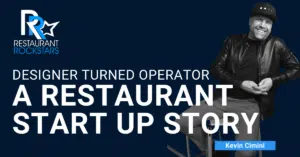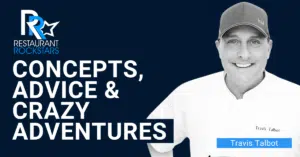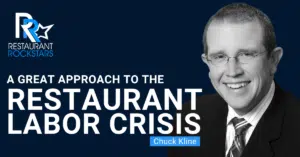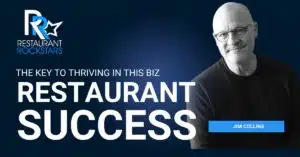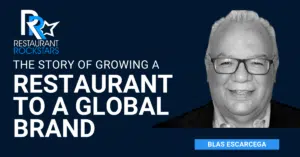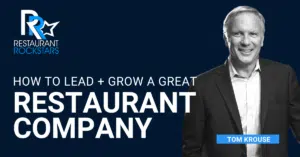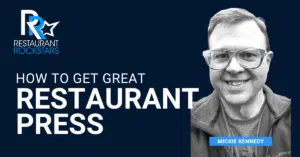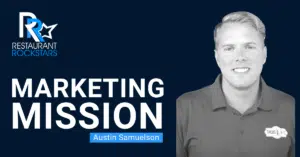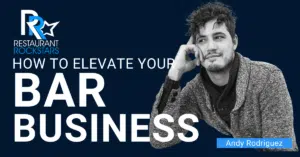Restaurant Rockstars Episode 317
Restaurant Insurance Pitfalls
LISTEN HERE OR ON YOUR FAVORITE PODCAST PLAYER
Prefer to watch the interview?
Click the video below.
No one could have anticipated the business risk that was the Covid pandemic.
As a restaurant owner at the time, my first thought was that it would be a temporary inconvenience! Never did I expect we would be forced to shut down, remove all our dining seats to become a market, and then pivot at least 3 more times.
I also thought our restaurant insurance had the business protected.
The point is, business risk is always around the next corner, ready to catch us by surprise when we’re busy taking care of business.
In this episode of the Restaurant Rockstars Podcast, I’m speaking with Clay Ogden of Strategic Risk Alternatives, a risk management expert who helps us understand restaurant insurance and potential pitfalls to your coverage.
Listen as Clay wisely advises:
- Why a business restaurant insurance risk management plan is essential for your operation
- The types of risk we may not be thinking about until it’s too late
- How you can protect your business from these unforeseen business risks
- About restaurant insurance company loopholes that may prevent your claim from being paid
- The difference between “direct” and “indirect” losses
- What is an 831b plan, how it relates to your current restaurant insurance, and how your business can tax defer for tomorrow’s risk
Working smarter not harder is what avoiding business risk is all about. Your restaurant insurance should provide all the coverage you need.
Listen to this episode, take a moment to plan for the future and then go out and Rock YOUR Restaurant
Roger
Connect with our guest
https://www.linkedin.com/company/sra-831b/
https://www.facebook.com/SRA831b
https://www.instagram.com/sra_831b/
0:00
Most traditional insurance policies don’t cover business interruption or the loss of income related to some form of a disruption. Right? When we start talking about the pandemic, started looking at the loss of revenue, the lot of a lot of business owners felt when they were deemed as non essential where they had to, you know, all of a sudden, all these mandates and, and whatnot took place, all of a sudden, there were a lot fewer people coming in the doors and the revenue slowed down dramatically, or they had to pivot in order to make things work in that in that space. And, you know, there’s a lot of business owners that really took it extremely difficult.
0:43
Hey, welcome back to the show. Thanks for being with us. You know, the pandemic had shown us that we need to think about the unforeseen, you know, no one can see around corners, but the unexpected in this business does happen. And as we can see, it can be devastating. Well think about the insurance industry, it exists like any business to make a profit. But the reality is, is you may have all the insurance in place, and there may still be legal loopholes in those insurance contracts that prevent you from getting your claim paid business interruption for a variety of things. You know, we’ve heard about this. So in this episode, we’re talking all about business risk, what you should be thinking about what has happened before as a benchmark, and how we can avoid these risks. I’m speaking with a business risk expert, don’t miss this episode.
1:31
You’re tuned in to the restaurant rockstars podcast powerful ideas to rock your restaurant. Here’s your host, Roger Beaudoin.
1:46
restaurant owners and managers, listen, this is important. If you haven’t heard of the employer retention credit, your business can receive lots of money back from the IRS money you’ve already paid in payroll taxes. Now the ERC program as it’s known is available. If your operation had fewer than 500 employees, you had to shut down or partially suspend your business or you had at least a 20% reduction in business due to COVID 19 in any quarter of 2020 in the first three quarters of 2021. Now how much is the credit up to $7,000 back per employee per quarter for 2021 and up to $5,000 per employee in 2020. Listen if you have 10 employees today and meet the requirements you could receive up to $260,000 back in a refundable tax credit. Now the faster you apply, the faster you get the cash, think of it as found money that you can use for any purpose payroll cost of goods, business improvement or other business expenses. Again, best of all, you do not need to pay this money back now works as a company that will do all the heavy lifting for you and get your business back the money that’s due. I’m speaking from experience here with whirks I received a sizable amount back in all available quarters for my former restaurant and I couldn’t be more pleased with their service their people and their process for a no obligation consult Click the link for whirks in the show notes to this episode. Don’t miss out. Get your consult today.
3:17
Get everything you need for your operation with Smithfield culinary. Their extensive portfolio lets you serve up a wide variety of proteins to keep your patrons happy. Choose from smokin’ fast which lets you add barbecue to your menu without adding a pitmaster to your payroll or browse their Margarita offerings encompassing everything you need for pizza toppings, plus a variety of specialty Italian meats like capicola prosciutto and salami. Finally, serve what you love with Smithfield, which includes everything from bacon to hotdogs to deli meats and so much more for the products and solutions to keep your operation running strong. Visit Smithfieldculinary.com
3:59
Welcome back, everyone. This is the restaurant rockstars podcast with me today Mr. Clay Ogden. He is the National Business Development Manager for strategic risk alternatives. He is a risk management expert. And we’re gonna talk all about the unforeseen, unforeseen risks when you are a small business or restaurant owner and what we can do the steps we can take to obviously mitigate those risks and put a plan in place to protect you for what is unseen. Welcome to the show. Clay How are you? Doing great, sir. Thanks for having me. Not at all. I’m happy to have you here. And this is a really important topic and it’s something that restaurant owners do not generally think about. You know, everyone needs insurance in their business, of course, and mostly those are casualty losses and fires and floods and you know, that sort of thing. And business interruption is a traditional thing in a restaurant in case your inventory goes bad because the freezer breaks down whatever it is, but there are a lot of risks that restaurant owners aren’t thinking about. We’re going to cover all that today but before we do your opinion passionate golfer. Let’s talk about that. I always like to ask my guests what are the passions? What do you do in life when you’re not working when you’re not raising a family and hanging out with your kids and you know, you play golf, your former professional golfer, tell us what that was like for you and what you’ve done.
5:15
I started playing golf when I was four or five years old, my dad would go to the golf course. And I would tag along with him and kind of just fell in love with practicing and in the game itself. And so I started playing at a young age, played a lot of Junior Golf around the country and played high school, golf, college golf, played at BYU for years. And then when I graduated, I turned professional and tried it for eight or nine years. So it was, it was a ton of fun.
5:44
I’m sure you still follow the pro tour, and you probably have your favorite golfers and all that sort of thing, right?
5:49
Yeah, I do. For sure.
5:51
Fantastic. And the Masters is something that’s just huge. And even if you’re not a golfer, it’s so compelling to watch. And there’s just so much history to Augusta National. And just the history of the game has always fascinated me I’ve played as well, but I don’t play as much now as I used to. And maybe I’ll get back into it. Maybe you’re my motivator to get back into golf.
6:11
Yes, I actually been lucky to be to Augusta once and it was
6:17
oh, that must be like the shrine Right? Like, oh my goodness, like just taking in the scene and the ambiance and the history and I can only imagine what that’s like that’s, that’s yeah, that’s incredible. Are you a tiger fan?
6:31
I’m not not a personal Tiger fan. What he’s done for the game of golf is unbelievable. It’s kind of it’s kind of hard to put into words what he’s done for the game. Yeah. Not a not a huge fan. In the sense of, you know him as an individual. But what he’s done for golf is pretty, pretty insane. Yeah, I remember my favorites were Arnie. Obviously back in the day, Ernie was not only an incredible golfer, but also a business person and entrepreneur and innovator in the sport and that sort of thing. And obviously, I like Nicholas I mean, that dates me, of course, and Greg Norman and all those things. But those were some of my heroes when I was playing golf back in the day. I’m right there with you. I grew up a huge Greg Norman shark fan. And Davis loved the third.
7:21
Rory, he’s a I’ve met him a handful of times. He’s a really really good guy actually reminds me a lot of Arnold.
7:29
But yeah, there’s there’s a lot of a lot of good that goes on in the game of golf. And it’s, it’s, it’s a great networking tool for sure. Yeah, definitely. In terms of business, I think that’s almost a given an expected it’s like a lot of business deals happen on the golf course. And for sure apps, you you obviously do the same and getting business. Let’s talk about before we get into what strategic risk alternatives is all about. Tell us why a risk management plan is important for a restaurant or Restaurant Group.
7:59
Yeah, so I mean, we work with business owners in any and every industry you can think of and, you know, most recently, over the last two or three years, the restaurant and entertainment space has, has felt the pain more than maybe any other industry from the from the pandemic. And just simply from the fact that if if you’re able to take a percentage of gross revenues, when things are going well and set them aside, for the uncommon, unforeseen uninsured types of events that are you’re going to manage anyway. So if we can find ways to take a little bit off the top and set it to the side, to more efficiently manage those issues when they arise. That’s really what this program is designed to do. So, okay, what type is of what types of risk should you know a business owner be thinking about? And obviously, the pandemic is a prime example, I want to talk about some of the things you saw during the pandemic that really affected business owners and operators and that sort of thing. But besides the pandemic, obviously, no one could have ever predicted that it totally you know, Sideswipe, this industry, as well as many others. But other than a pandemic, what are typical risks that most business owners just aren’t thinking about, besides the standard fire flood? You know, that sort of thing? Loss of business stuff? Yeah, I mean, everybody’s kind of familiar with the, you know, the standard traditional business risks, right, that they they have to have, we help with the things that are maybe a little bit less of a thought, but are very blaring issues, things like brand and reputation. mean everyone’s brand and reputation is their business and it just ultimately falls to the business owner to to make sure that they’re covering those potential losses. In today’s world with social media, it’s a big deal. Yeah, brand and reputation can go sideways in a hurry. Let’s let’s talk a little deeper about that because that’s something I wouldn’t have traditionally thought of
10:00
out. Okay, so social media, and brand and protection about that. Are we talking about trademarks and copyright type things that may or may not impact a business’s future? If someone’s stealing proprietary technology or something that they do that’s unique and different that isn’t protected. Tell us. Tell us what you mean. Yeah, I mean, potentially, yes. A little bit more of the, you know, someone said something, someone did something, maybe it’s a the owner, maybe it’s an employee, right? Yeah, we’ll post something that reflects negatively on the image of, of your, your restaurant or your business name, I see. And, you know, people all of a sudden start saying, Well, I’m, I’m not going there, because this happened or so and so said something right, and then all of a sudden, it kind of starts to steamroll. And those things can have a pretty negative impact pretty quickly.
10:56
You know, the other policies that we look at and other risk coverages we look at are things like a dispute resolution policy, someone bringing legal action against the business.
11:07
You know, in today’s world, it happens all the time. Yeah, you know, it’s interesting, you say that, because here in the state of Maine, there’s been some social media outcry. And I think it’s even gotten national attention where an insurance agency staff person placed a note in the door that they were closed on June 18. And there was a negative reference to that particular holiday that somebody picked up on it went viral. And now that agency is like, boom, right? In the thick of this whole thing. And these are the types of things we’re talking about. I would I would assume, right? Totally. Yeah. I mean, gotcha. Start looking at things like business interruption. Most traditional insurance policies don’t cover business interruption, or the loss of income related to some form of a disruption. Right, when we start talking about the pandemic,
11:59
you start looking at the loss of revenues, a lot of a lot of business owners filled when they were deemed as non essential, where they had to, you know, all of a sudden, all these mandates and, and whatnot took place, all of a sudden, there were a lot fewer people coming in the doors and the revenue slowed down dramatically, or they had to pivot in order to make things work in that in that space. And it’s, you know, there’s a lot of business owners that really took it extremely difficult. I can speak from experience to that. I’ve been in the restaurant industry for 20 plus years, as an owner sold all those properties in 2014. But just before the pandemic started, I had the brilliant idea of getting back in the restaurant business and buying a restaurant. And then all of a sudden the pandemic hits and the state mandate required closure for an you know, unspecified amount of time. And it’s like, okay, what do you do, and I immediately took action, and obviously took advantage of SBA, they call them economic injury, disaster loans. And that was the first step and then the PPP came and all that was positive, but we had to do numerous pivots. And when you have a sit down restaurant that’s closed for an unspecified amount of time, and you have to limit the amount of people inside once you can reopen, we had to literally rip out all the booths and seats and turn our full service restaurant into a market Grab and Go concept. And that was a huge pivot, which ultimately worked and you know, helped to save the business. But it’s like a lot of restaurant owners and business owners in general, were blindsided weren’t able to do these quick pivots, tried to put in insurance claims some of these claims were in fact denied. And you can speak from experience to some of those things, and the legal loopholes. Let’s talk about some of that. And what you’ve seen in terms of, you know, a restaurant owner signs, an insurance contract with an agency, they don’t see certain things that happen. And then all of a sudden, they tried to put in a claim, and they’re denied. What have you seen about denied claims? and for what reasons
14:01
within our program or within denied claims in the traditional sense, in the traditional sense? Yeah, I think a lot of people, especially during the pandemic, and 2020 20 to 21, were really frustrated. I mean, it made major national headlines seemed like every day of, you know, my traditional insurance isn’t covering my business interruption. And, you know, as much premium as these major carriers bring in on an annual basis. They don’t underwrite policies, and they don’t bring in premiums to cover business interruption. And there was at one point in time, I want to say it was March April May of 2020. That there was a on a weekly basis was roughly three to 400 million or billion dollars in a loss of revenue from a business interruption since weekly. No kidding. Now, a lot of these major carriers are bringing in, you know, 70 to $100 billion in Premium annually, they would have all gone insolvent instantly had they been forced to cover these business interruption claims. And so, you know, that’s not something that they underwrite. It’s not something that they’re willing to take on that potential, you know, massive, massive risk, and it’s very difficult to price that. And so it ultimately falls to the business owner, which a lot unfortunately, a lot of people found out that they were kind of caught flat footed, that they were the ones, you know, carrying the bag on that trying to protect themselves. If and when something like that happened.
15:35
I see. Gotcha. Let’s talk about strategic risk alternatives, and how long you’ve been in business and what you really specialize in. And then once you answer that question, let’s talk about work with Fortune five hundreds and why those tools are now available for smaller business owners and, and how those things translate. And then we’ll talk about obviously, the plans that you helped put operators and owners in place. Yeah, sure. So, SRA, we started 2007 2008. Kind of maybe not an ideal time to start. But we, you know, one of our founders actually was a property casualty insurance agent. And a lot of his business was business owners coming into him in the fourth quarter saying, Hey, I got I went, bought a new truck, I went bought some new equipment, kind of the save on taxes, right, they’re spending money to save on taxes. But they’re now picking up a new payment. And they’re financing it, they didn’t pay cash for it. And when the economy slowed down, they had all these things that they had bought as a kind of a risk management tax play, if you will, and they didn’t necessarily need it. And when the economy slowed, they didn’t have enough revenue to pay for all the stuff. And so the people that had cash flow, or excess reserves set aside, or showing up to the auction buying, buying their buddies stuff for 50 cents on the dollar. I mean, this is a piece of the tax code that’s been around since 1986. It is specifically designed to allow a business owner to take excess profits, excess revenues, set it aside for these very uncommon, uninsured types of risk. So at SRA, that’s exactly what we do. But we specifically built our programs and to work with the small to mid market business owner and brought these these types of plans available to the business owner that’s doing a million to 35 million gross revenue. Right, the fortune 500 companies, as you said, have been doing this for decades, 50 6070 years, right. But this is something that has now become very much an option for that small to mid market business owner. And it’s a it’s a planning tool that helps the business owner essentially, combat these uninsurable types of events, if and when they come up, and, you know, potentially provide some some tax advantages along the way. I see. So I guess there are some similarities.
18:18
I’m guessing most people are familiar with IRAs or individual retirement plans where obviously those funds are, you know, deferred taxes until retirement age and all that sort of thing. So I’m hearing that you can put certain, obviously revenues aside in good years against future potential risk in these funds, or I should say, you know, that income is tax deferred. Is that what I heard? Is that correct?
18:43
That’s correct. Yeah. So any and all premiums that are set aside are actually 100% deductible to the business in the year that they’re set aside? Gotcha. Very, and they are going to be a deferred dollar. For sure. Now, a typical plan is called an 831. B, is that the primary vehicle we’re talking about here? And if so, could you explain what that plan entails and how it works and what the steps would be to if my audience is interested in working with your firm or getting more information on this? They’re literally thinking about an E 31 B plan. What does that mean, and what does that do for them?
19:21
Yeah, absolutely. So any 31 B is actually a section of the tax code that was brought forth by Congress in 1986. And it was kind of brought forward in the 80s to help farmers subsidized crop insurance. They were unable to, you know, in the insurance crisis in the mid 80s. They were unable to insure their crops. And so they were they introduced this bill or this piece of the tax code so that the, the farmer or the business owner could take specific amounts of revenues, set it aside to now ensure for the uninsurable and that’s really where, you know, we’ve tried to bring this very much available to that, to that small to mid market business area.
20:09
What the 831 B has kind of turned into is it’s kind of evolved, like the 401k, a little bit is very much a, okay, take dollars, I’m willing to defer them for these various risks. And if I need them, while the policies are in place, that’s what they’re set aside to do. If I want to pivot at some point in the future and take a potential shareholder loan or a dividend out of there, I can pull that back to myself as the shareholder. Oh, gotcha. Yeah, so there’s definitely a lot of flexibility from a risk management slash planning options. That’s, that’s really good information. I wouldn’t want to give anyone the impression that once you sign this up, it’s locked in place, and that there is no flexibility. So what you just mentioned is really relevant. You know, we talked about business interruption, being one of those things that, you know, insurance carriers just weren’t going for. And you explain the reasons why. And that made perfect sense. But there are also other indirect losses. Can you give us any examples of those? Yeah, I think we’re still seeing, you know, massive issues with supply chains this year. And supply chain interruptions, you know, supply chain policies are very attainable on the open market.
21:27
But unfortunately, they don’t, they’re not, you know, they’re not a catch all. They don’t cover anything and everything, right. And so, unfortunately, a lot of business owners have felt the effects of, you know, these supply chain interruptions, but they’re not necessarily being covered by their traditional carrier. And so they’re just, we’ve had quite a few clients that have bought extra, you know, extra stuff to run their business, just so that they can try to get by, while they have whatever they’ve purchased them to run their business, right. We’ve seen people that have had a 20 or 30% increase in the supplies that they bought. We’ve had people that have said, you know, what, I just can’t, I can’t buy enough product for my business. And so my revenues are just lower because of it.
22:15
You know, very, very much a very much a big issue in the last three or four years. Are these programs, customizable, a specific example comes to mind what you just said. So there have been huge spikes in certain food goods that have been affected by the supply chain, you know, chicken has been one. So if you’re a chicken wing joint, and suddenly your case goes up by 20 bucks a case, and you can’t raise the price to cover the increased costs and pass that on to the end guests. You’re in a lurch if you’re a steakhouse, and you know, 1000s of cattle just died. Now there’s going to be a supply chain issue with cattle and you own a steak house. And that is a very limited menu, you don’t have much more, you know, when I’m going with this, is that something that obviously is unforeseen that you can cover through one of these plans that basically takes care of that problem? Absolutely. Yes. That’s terrific. Excellent. Let’s talk about the process of working with you or strategic risk alternatives. What is it? Walk us through what it’s like to work with the client, how you assess the risk, how we talk about envisioning some of these unforeseen things, and then recommending a plan that really works for any individual client? Yeah, so I mean, ideally, we’re going to work with the business owner, we’re going to work with their advisors or their CPAs and tax advisers, and kind of get everyone on the same page as to, you know, what the financials look like? How much can we potentially set aside to, you know, to manage these potential risks for the next 12 months? And each year, we’re going to reevaluate that.
23:55
As far as determining the risks, we’re going to work again, with the client and those advisors to really pinpoint what what issues they have inside of their business, what keeps them up at night? What things are they technically self insuring right now that they’ve never even thought about? And a lot of the times the business owner just says, well, that’s just part of doing business. Well, it is part of doing business. But if there’s a way to more efficiently, cover these potential things that are just part of business. And we can become a little bit more efficient from a revenue standpoint or from a number standpoint within the business, it can make all the difference. And being able to set those dollars aside and pull them back when in a time of need into the business for a potential, you know, issue with a maybe a political risk event. Well, we got government bodies deciding who’s essential and non essential or maybe there’s a statute or something that changes and it drastically impacts your business. That’s something that’s completely outside of your control, but nonetheless, you’re going to feel the effects of it?
25:01
Yes. Okay. Let’s talk about other risks or obligations to suppliers and vendors. Because at any given time, based on the size of a restaurant operation, you can go anywhere from 5000 to 50,000. And even more just in product that you take in on terms, there are giftcard obligations to your guests, there are, you know, other supplier obligations that you pay in advance or contracts that you sign and all these things can come back to haunt you when something unforeseen happens, and now you’re on the hook for could be potentially hundreds of 1000s of dollars based on your organization, all of these things can be covered under one of those plans as well, they all fit within the parameters of an 831. B. Very Yeah, potentially. I mean, those are kind of we’ll have to talk through some of those scenarios, maybe there might be something that may not be covered. But we’ve tried to make sure that we write all of our risk coverages. Very, very broad, so that if it’s outside of the scope of traditional insurance, you know, we’re we’re hopeful that this will be a really good plug and play for for any client or any business owner.
26:11
We’re also always looking to expand on some of our risk coverages. And so if we talk to somebody, and they bring up a concern of theirs, and this is something that we, you know, maybe not covered within our program, or any coverage we have now, we’re always looking to potentially draft a new coverage to fill that need.
26:30
So is your firm license to do business in all 50? States? Can you work with clients anywhere? Yes. Okay. And I think you mentioned sort of a threshold of businesses that can sort of benefit from the same tools that the fortune 500 is using, is there a minimum business size? That is sort of a cut off? Where it doesn’t make sense to look into these plans based on fees based on? You know, based on the risks involved? What would that be? Absolutely, I would tell any business owner, you know, if you’re able to set aside 75,000 or more a year, in profits and revenues, yes. This is going to make sense. It’s something to look at more, the more you set aside, the more you put us, you know, put into an A 31 be the better it looks, the better it works. But I would say the the minimum would be roughly 75, grand and up anyone that’s doing that amount or less, honestly, it might not make sense for him.
27:28
So do you see similarities between different industries? Obviously, you mentioned you work with a variety of business types and restaurants are no stranger to your firm, I’m sure. But is it that specialized? Are that different from any other business? Or is the same basic guidelines apply? And you just take a closer look at this particular restaurant business, and then you can assess those risks based on prior experience and that sort of thing?
27:57
I would, I would say they’re all a, you know, across industries is very similar. You know, we’re, there’s, there’s lots of risks that every business owner has, you know, that they’re, they’re self insuring. And so I wouldn’t say it’s an industry specific thing where there’s, there’s more need or less need. It’s very easy to find risks that are being carried on the balance sheet of the business with after tax dollars. And if we can set aside those funds, and now use those pre tax monies. To manage those very same risks, it just makes sense.
28:36
Restaurants have been hit hard the last few years, which means restaurant owners and staff are working harder than ever trying to meet the demands of in person hospitality can be really demanding, which is why I recommend popmenu answering popmenu answering turns every phone call into an opportunity. It uses artificial intelligence to answer the simple questions that are tying up your phone lines like can I make a reservation or where are you located, and over 50% of restaurant guests are happy to have their questions answered by an automated system. Within the popmenu platform. You can customize answers for your restaurant and choose the voice your guests here, and even send follow up links via text message. Popmenu answering picks up your phone 24/7 365 days a year allowing you and your team to focus on what matters most pleasing your guests, prevent lost customers and impress your guests with popmenu answering. And for a limited time my listeners can get $100 off their first month plus lock in one unchanging monthly rate at popmenu.com/rockstars go now to get $100 off your first month and learn more about popmenus full collection of tools at popmenu.com/rockstars rock on
29:56
listen. I’m all about marketing but believe me for very few marketing ideas today are fully trackable where you know exactly where the business is coming from. And you also know that it’s generating a positive return on your investment. Now, I no longer own restaurants. But if I did, this idea would be at the very top of my marketing plan. It’s all about birthdays. Everyone has a birthday, and they are a huge Let me repeat that huge source of business in your restaurant. Why wouldn’t you want to focus in on reaching everyone with a birthday in your area? Well, you can with the birthday club from Fan Connect. Best part is they do everything for you. You get a turnkey marketing system that sends birthday cards in advance, inviting people to celebrate your restaurant from your area code, plus a sign up strategy for your existing customers, new business, repeat business hire check averages and a massive customer database. You can get all this with the birthday club, check it out and sign up now at get fanconnect.com/birthdayrockstar
31:06
besides yourself? Is there a team of people that are then dedicated to a new client where that is your go to person into the future? Once you work with that person, you get the plan in place? They answer your questions. They literally work with you as risks change as time goes on all that sort of thing?
31:25
Yeah, yeah, well, our team is always growing. We have an awesome team, as far as who’s going to, you know, I’m going to my myself and my teammates are going to help onboard a client. And then once they’re on as a client of ours, we’re actually going to have three or four or five people that are specifically working with that client on any any needs, or any questions or anything like that.
31:49
Now, most business owners, much like myself, in my former life, as a restaurant owner, are fairly familiar with the standard insurance products that we can buy, and they build a relationship with an agent and then an agent can recommend certain things. And then there’s something that we’re also familiar with called an umbrella plan that sort of gives you a higher level of coverage to your standard plan. Does some of the things we talked about get covered under an umbrella? Or is this totally outside the realm of an umbrella? And I’m even forgetting what I was covered under that umbrella. I always had it. I just don’t really remember what types of things that covered. And if there’s any crossover between this 831 B that seems to take us in a further direction. Can you answer that?
32:33
Yeah. So an umbrella policy would absolutely be completely outside of anything that we’re discussing today. Okay. You know, that that’s kind of the default. And it is, it’s it’s very common to hear someone say, Oh, I’ve got an umbrella policy. And a lot of people tend to think when I have an umbrella policy, it’s a all encompassing covers anything and everything right. And yes, it just doesn’t. It’s still very specific, it’s still very detailed in what is covered, what is not covered what your limits of liability are. So yeah, I mean, we’re literally going to be looking at all of the risks that, honestly, most business owners don’t even don’t even recognize this risks. They’re just, no, yeah, I’ve covered that before, or I’ve, I’ve taken the hit on that, or, you know, a semi went down or those these cattle pass, you know, they ended up dying. And, yeah, it’s going to be more difficult to get product. I mean, it’s just those things, they kind of just roll with it right. But in just in certain times that it can be incredibly impactful in a negative stance, and I might not have the available cash flow to pivot anywhere. And so for those particular business owners that have a vehicle like this, they have the option to, okay, I might need to file a claim, I might need to pull some funds back into my business for this set event that took place. And it can, it can make things feel like a little bump in the road rather than feeling like you just ran into the wall.
34:05
This conversation is sort of triggering some pandemic memories for me. And I remember during the heart of the pandemic, not anything I got involved with, but the industry as a whole started sort of trying to defend claims against the insurance industry as a whole for some of these indirect losses that they were just not covering. And I even remember, I think if memory serves that the National Restaurant Association got involved, there may have been a class action lawsuit against certain carriers that you know, should have covered things or so the NRA says, or the industry as a whole says, and I don’t remember how that turned out. I’m not sure it went positively. But these are some of the things we’re talking about. It’s like wow, this is this is reality and you can’t rely on, you know, future lawsuits or even be able to defend a claim against something far bigger than yourself. So everything you’ve talked about makes perfect sense, makes perfect sense here. How do we get in touch with your firm? Is there a URL you want to mention? Is there another way to contact someone at your organization? If my audience is interested in learning more, or even, you know, taking advantage of an 831? B?
35:14
Absolutely. Yeah. So are kind of going along with the topic here is our website is actually 831 b.com. Okay, I got a bill in the show notes. Yeah. 831b.com. That’s easy to remember.
35:29
Yeah. Right. It’s, it’s actually a really good, there’s a ton of educational notes on there. Lots of history of what the 831B is, and then a lot of information about our program and how to how to get in touch with us. And so if someone is interested, please jump on the website, reach out, myself or anyone for my team will will absolutely be capable of answering any of your potential questions. You know, we did cover a lot of in depth information here, I got a really good sense of what you do and what some of those risks are, and the importance of these plans. Have we missed anything? Is there anything else you want to share with the audience? I mean, there’s, there’s a whole lot of, you know, into the weeds, stuff that we can go into, and different things that can potentially be covered. But I think high level this gives should give people a pretty good idea of, you know, what this what this piece of the tax code is, and how it could potentially impact their business? For the better. I would tell really any business owner out there that if, if they’re unaware of what this is, or if their CPAs, or tax advisers are unaware of what this is, it’s probably something they should at least be looking at, to see if it’s something that could potentially be a positive for them.
36:48
Honestly, still, it’s still crazy. But it’s been around for almost 40 years. And I would say, maybe six out of 10 CPAs. And tax advisers know what this is, right? It’s, yeah, it’s not new. But it is new to a lot of people. And as you said, those fortune 500 companies and large enterprises have been utilizing these tools for a long time. And it’s really starting to become a more a normal business practice in the small to mid market business space. Yeah, I mean, the restaurant business is, you know, one of 1000 details. And this is not something that is on an owner operators radar, it just isn’t however, when it’s too late, it’s too late. And a risk mitigation strategy, I believe is highly important. So I think this is a really relevant episode. And I certainly appreciate you, Clay for coming on and telling us all about it.
37:39
Absolutely. Yeah. Thanks for having me. Yeah. What’s something you said right, there is perfect business owners are. They’re so involved in the day to day and they’re excellent at running their businesses. But when these things come up, and if they haven’t been thought of ahead of time, it is too late.
37:56
Well, thanks so much for sharing your expertise and all that information. I think it was an eye opener and like, like I said, during these crazy, uncertain, crazy times, highly relevant topic, for sure.
38:08
Thanks for having me. Thank you.
38:10
That was the restaurant rockstars podcast. Thank you so much for our audience for tuning in once again, and we can’t wait to see you in the next episode. Thank you so much clay for sharing all your knowledge and insights and expertise into business risk. It’s something that we all need to think about. You know, you can’t just go about your everyday business because things can and will happen. So it’s obviously best to put a system in place and have a strategy before anything goes sideways. Thank you also to the sponsors of this week’s episode. Smithfield culinary, popmenu, whirks and the birthday club. Can’t thank you all enough for being here. Can’t wait to see you next time, so don’t miss our next episode.
38:52
Thanks for listening to the restaurant rockstars podcast for lots of great resources, head over to restaurant rockstars.com See you next time.
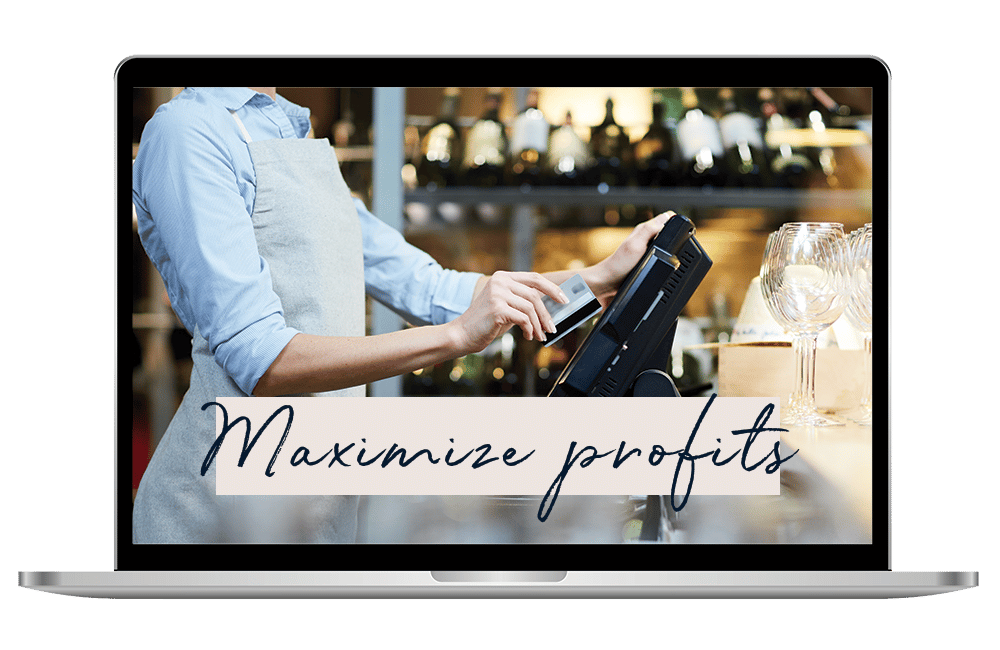
The three costly mistakes you could unknowingly be making?
Find out in this FREE guide and restaurant assessment specifically designed to reveal the unexpected hurdles standing between you and exponential business growth.
Thank You To Our Sponsors
Did You Know That 7 out of 10 Adults Dine Out To Celebrate Birthdays?
You Can Easily Capture This Lucrative Business!
For a limited time only, popmenu is offering our listeners $100 off your first month plus an unchanging lifetime rate.
Request a DEMO:
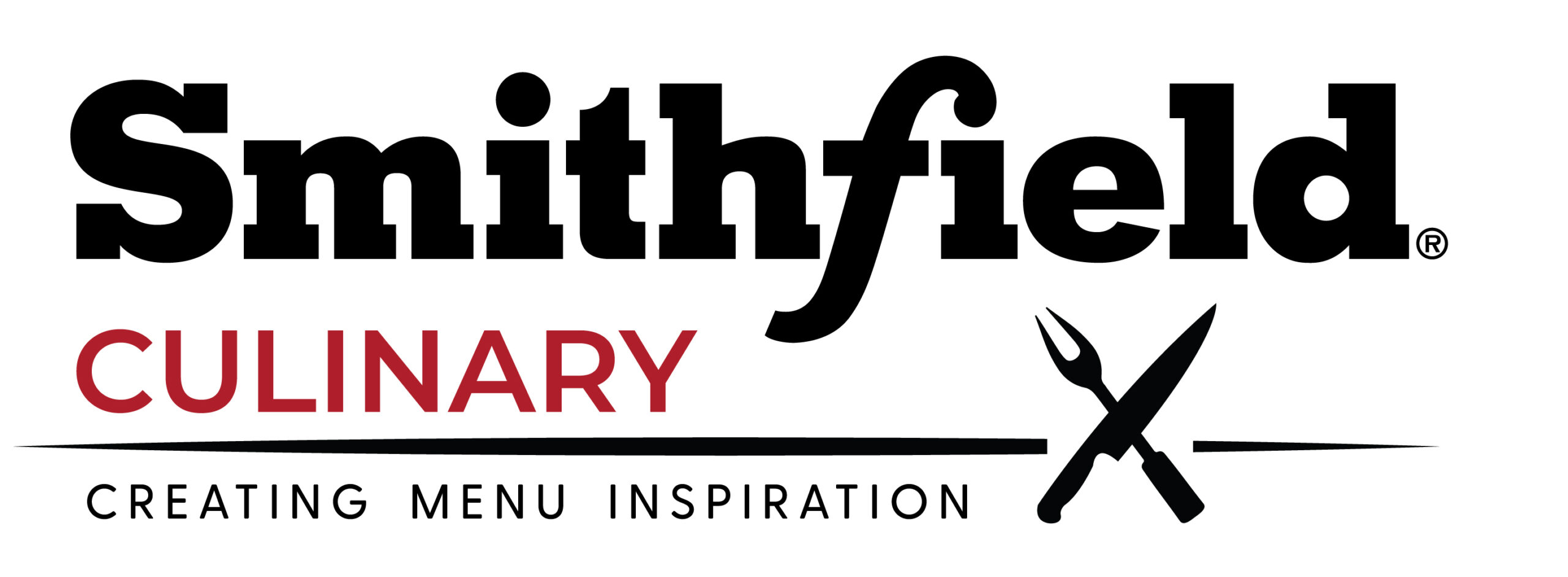
Inspiring Head-Turning Menu Creativity
Culinary Trends & Chef Inspired Recipes - Learn More

The Employee Retention Tax Credit
We will help you determine your eligibility for 2020 & 2021 - Get Started
Want to become a podcast sponsor?
Please get in touch with Roger at roger@restaurantrockstars.com

